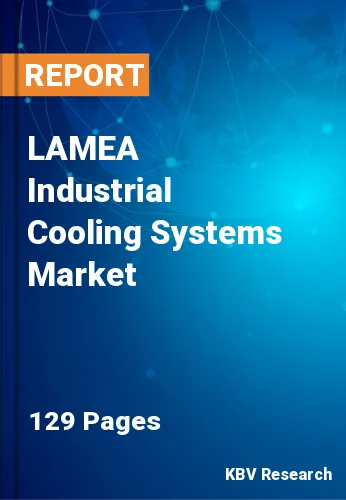The Latin America, Middle East and Africa Industrial Cooling Systems Market would witness market growth of 8.8% CAGR during the forecast period (2023-2030).
The IoT as well as smart technology integration, have opened up a lot of opportunities for the market. Sensor and data analytics powered by IoT can improve system performance, promote predictive maintenance, allow remote monitoring and control, and increase overall effectiveness. Companies that take advantage of this technology might be able to offer advanced, intelligent cooling solutions.
Furthermore, the use of technology like evaporators/passive coolers, as well as absorption refrigerators in cold chains, helps to minimize harvest spoiling. In addition to agroclimatic conditions, high and extreme temperatures also contribute to market expansion. The equipment, methods, and practices of industrial cooling systems are intricately arranged.
A wide range of businesses, including manufacturing, power generation, data centers, chemical processing, and many more that produce a lot of weight while carrying out their operations, need this technology. The major goals of an industrial cooling system are damage prevention, maintenance of the best working conditions, confirmation of machine effectiveness, and extension of the machinery by remote access by tools or procedures.
Saudi Arabia is one of the greatest net exporters of petroleum and is home to over 17% of the world's proven oil reserves. The world's second-largest proven oil reserves are in Saudi Arabia. The two main parts of Saudi Aramco's business are upstream and downstream. On average, Aramco produced 11.6 mmbpd (million barrels of oil per day) of hydrocarbons till June of 2021, of which production of crude oil accounted for 8.6 mmbpd. Saudi Arabia's production increased alongside OPEC+'s gradual quota increases; as of June 2022, Saudi Arabia produced 10.3 mmbpd of crude oil. As a result, there is a higher demand for cooling systems in this nation. As a result of the burgeoning oil and gas industry, the regional industrial cooling system market is growing.
The Brazil market dominated the LAMEA Industrial Cooling Systems Market by Country in 2022, and would continue to be a dominant market till 2030; thereby, achieving a market value of $451.2 million by 2030. The Argentina market is showcasing a CAGR of 9.4% during (2023 - 2030). Additionally, The UAE market would register a CAGR of 8.5% during (2023 - 2030).
Based on End-user, the market is segmented into Chemical, Oil & Gas, Utility & Power, Pharmaceuticals, Food & Beverage, and Others. Based on Function, the market is segmented into Stationary Cooling, and Transport Cooling. Based on Product Type, the market is segmented into Evaporative Cooling, Air Cooling, Water Cooling, and Hybrid Cooling. Based on countries, the market is segmented into Brazil, Argentina, UAE, Saudi Arabia, South Africa, Nigeria, and Rest of LAMEA.
Free Valuable Insights: The Worldwide Industrial Cooling Systems Market is Projected to reach USD 23.4 Billion by 2030, at a CAGR of 5.6%
The market research report covers the analysis of key stake holders of the market. Key companies profiled in the report include Airedale International Air Conditioning Ltd. (Modine Manufacturing Company), Emerson Electric Co., GEA Group AG, Johnson Controls International PLC, Schneider Electric SE, SPX Technologies, Inc., Baltimore Aircoil Company, Inc. (Amsted Industries), Brentwood Industries, Inc., Star Cooling Tower Pvt Ltd. and Rittal GmbH & Co. KG (Friedhelm Loh Stiftung & Co. KG).
By End-user
By Function
By Product Type
By Country
Our team of dedicated experts can provide you with attractive expansion opportunities for your business.

